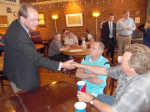Hassebrook optimistic about latest poll

McCOOK, Nebraska -- A Rasmussen poll released last week shows the race to be the next Nebraska governor might be closer than some would expect. The poll was conducted on May 14-15 and surveyed 750 likely voters, with 47 percent supporting the Republican candidate Pete Ricketts and 40 percent behind Democratic candidate Chuck Hassebrook.
Hassebrook visited McCook Thursday as part of a two-week statewide campaign tour and said, not only was he not surprised by the results, but given the poll's margin for error and sampling data he believed the race was even closer.
Hassebrook said the poll was confirmation of what his campaign has been saying all along, Nebraskans still vote for the person, not their political party. Hassebrook also pointed out, despite Nebraska being a primarily Republican dominated state, three of our last seven governors were Democrats.
Hassebrook said tax policy and Medicaid expansion were a couple of the key issues which he and Ricketts held opposing views.
Hassebrook said property tax is the most burdensome tax for Nebraskans and he would focus efforts on relief, while Ricketts has said his priority would be lowering income tax for the top earners.
Hassebrook said Ricketts approach would "squander our ability to invest in the future and inevitably end up shifting tax to ordinary working families."
Hassebrook said 50 years ago the average CEO had an annual income 20 times that of the average worker, a difference which has increased to 275 times in today's workforce, with the world's largest fast food chain and other large employers leading extreme examples in the 1,200-times range.
"Which is why I would not go along with shifting the tax burden," said Hassebrook.
Hassebrook said he and Ricketts were also on opposite sides of the fence when it came to the expansion of Medicaid. Hassebrook said legislators failure to expand Medicaid during their recent session was driven by partisan politics and, although he understood many supported the resistance as a way to stand their ground on the partisan drive behind the Affordable Care Act, the decision was not what was best for Nebraskans.
"We have always been different here and did what was best for Nebraskans. We should not bring partisan politics from D.C. to Nebraska," said Hassebrook.
Hassebrook said the refusal to expand Medicaid at the state level has penalized three groups in particular. Larger families, which he refers to as the "working poor," whom could get Medicaid if they weren't working but currently make too much to qualify for it.
"The second group is every one of us at risk of losing our hospital," said Hassebrook. Hassebrook said many families who can't afford insurance and make too much to qualify for Medicaid, end up receiving uncompensated care from hospitals bound by law which prevents them from refusing care.
Hassebrook said much of the funding hospitals previously received from the federal government, to assist with covering the expense of uncompensated care, has since been shifted to the Affordable Care Act. This has resulted in uncompensated care being much more difficult for rural hospitals to fiscally absorb.
"We will lose rural hospitals," [as a result] Hassebrook said.
The third group being hurt by the failure to expand Medicaid are those who have health insurance, who are experiencing increased premiums and additional fees resulting from the recurring uncompensated care, according to Hassebrook.
He touted his 18 years as the Executive Director of the Center for Rural Affairs in Lyons, Nebraska, as proof he has experience working to support both small business and rural towns.
Hassebrook said be spent 36 years working with the center and helped grown more than 10,000 small businesses during that time.
Hassebrook also spent 18 years as a Regent for the University of Nebraska and said his efforts led to increased tuition assistance for rural areas.
"I have fought for people out here in greater Nebraska and I think they will remember that," said Hassebrook.
